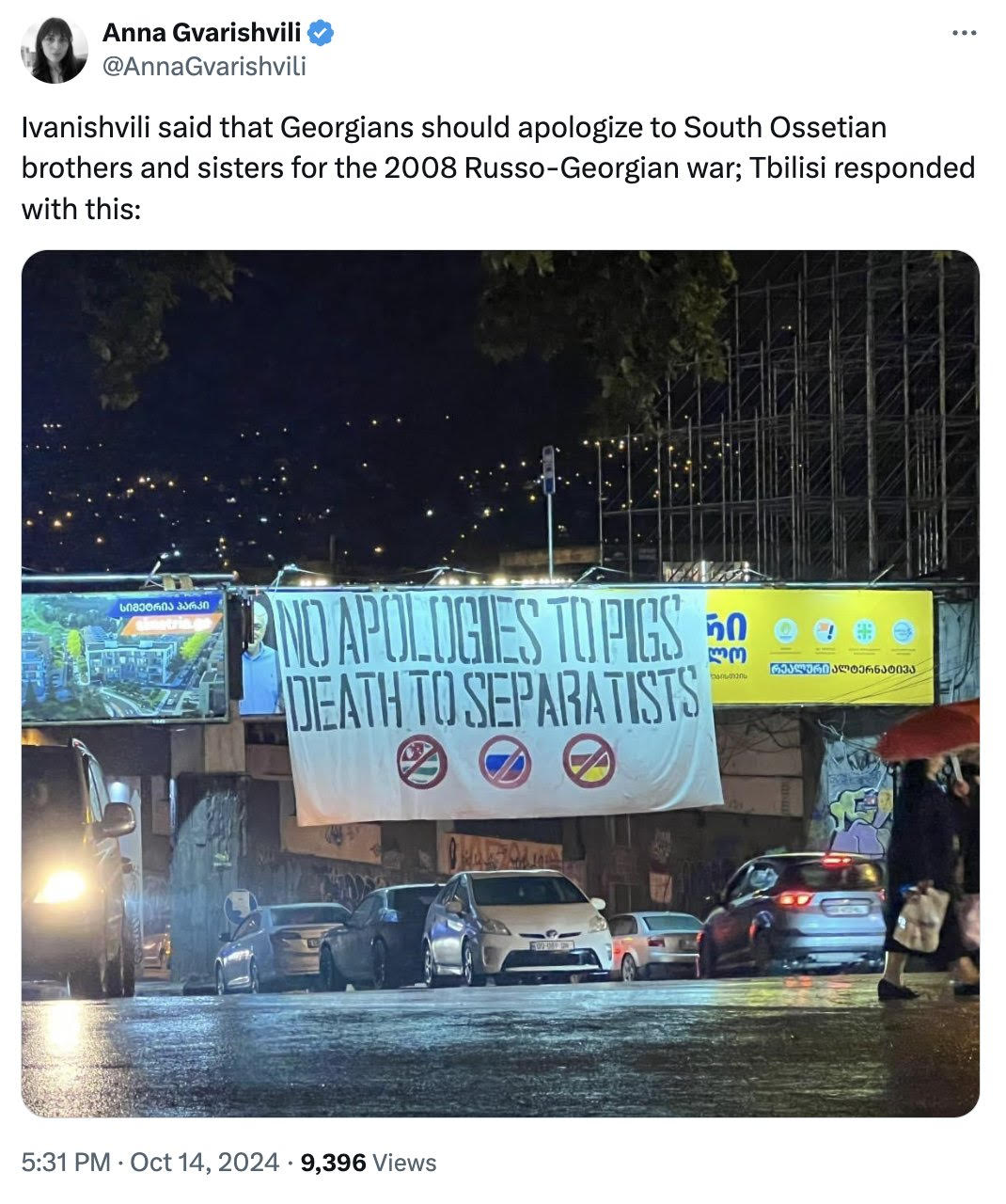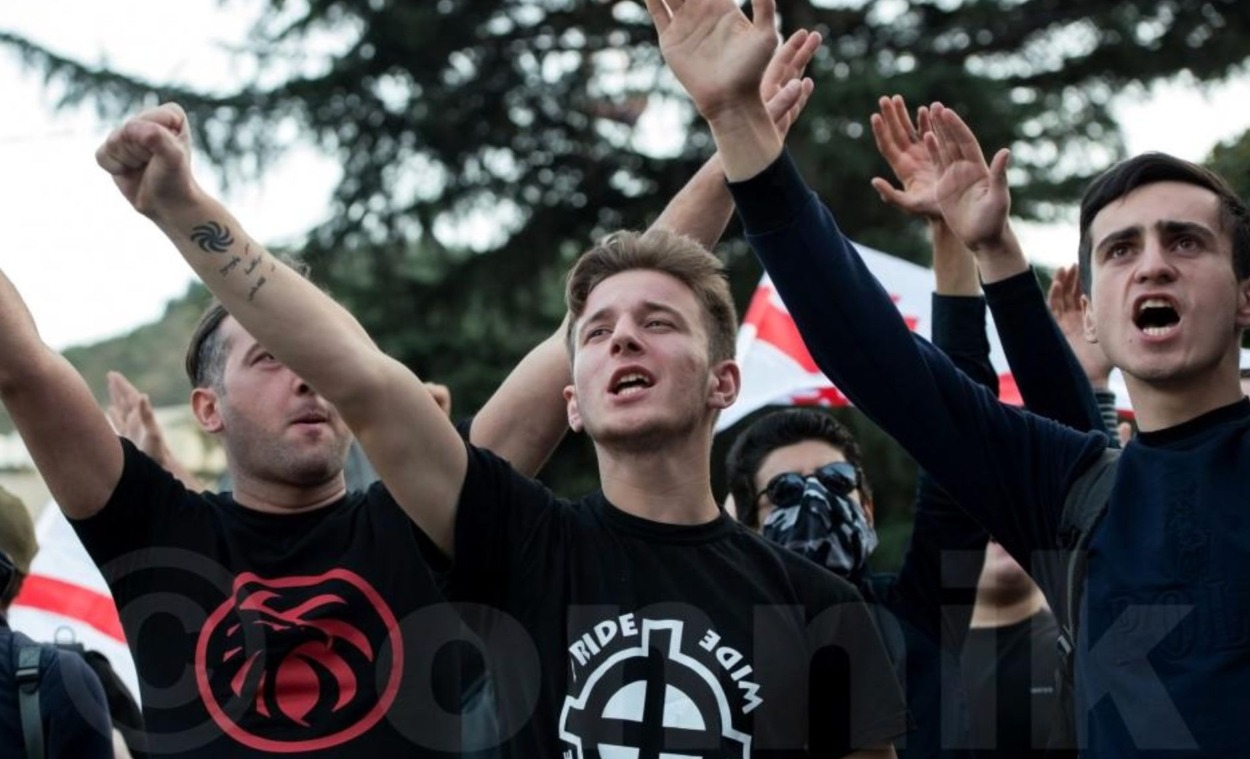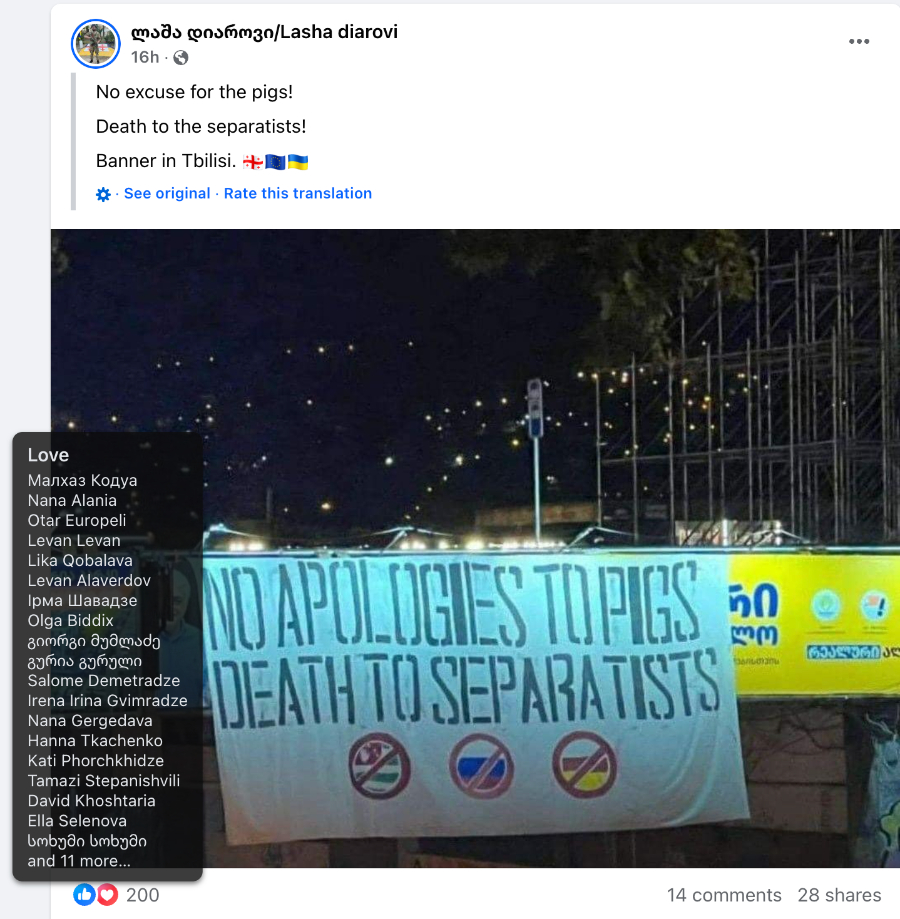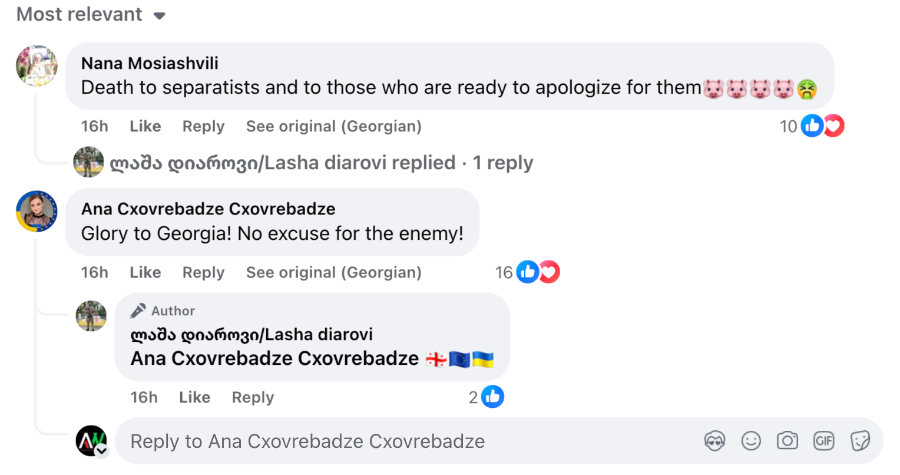Tbilisi's Banner of Hate: The Latest Nationalist Outrage in Georgia

In a stark manifestation of escalating nationalist sentiment, a large banner recently appeared on the streets of Tbilisi, emblazoned with the chilling declaration: "NO APOLOGIES TO PIGS, DEATH TO SEPARATISTS". The banner prominently displayed the flags of South Ossetia, Abkhazia, and Russia, each defaced with red slashes—a grim symbol of the deep-seated tensions and unresolved conflicts that continue to plague the region.
The poster emerged following recent remarks by Bidzina Ivanishvili, founder of the Georgian Dream party, who suggested that Georgians should "find the strength" to apologise to South Ossetians for the suffering inflicted upon them during the 2008 Russo-Georgian War. Ivanishvili's call for reconciliation pointedly referenced the actions of the previous Georgian government, led by Mikheil Saakashvili, which he implied had ignited the conflict.
Ivanishvili's statement has faced swift backlash from both opposition figures and segments of the public. Critics questioned the sincerity of his intentions and the timing of his remarks, accusing him of undermining national unity and capitulating to separatist sentiments.
Journalist Anna Gvarishvili, editor and head of the Investigative Media Lab, amplified the message by proudly sharing an image of the banner on Twitter, declaring, "Ivanishvili said that Georgians should apologise to South Ossetian brothers and sisters for the 2008 Russo-Georgian war; Tbilisi responded with this." Her posts were subsequently deleted.


+ BBC: Georgia aims to raise patriotic youth [2010]
+ Georgia’s Ultranationalists: Going Fascist on Facebook
+ "Georgia for the Georgians": The Evolution of a Nationalistic Slogan
+ Nasty Nationalism, by E. Wayne Merry
Analysing this incident in a broader context reveals that the Tbilisi banner is symptomatic of a resurgence in Georgian nationalism, a force that has significantly shaped the country's politics since the late 1980s. A particularly troubling manifestation of this nationalism is the slogan "Georgia for the Georgians", which emerged during that period, echoing the exclusionary sentiment of "Deutschland über alles!". This slogan, championed by radical nationalists under the leadership of the late Zviad Gamsakhurdia, was associated with violence and discrimination against minorities, especially in Abkhazia and South Ossetia. Despite its contentious history, the slogan continues to resurface in Georgian political discourse, symbolising intense ethnic pride and a fervent call for national unification—a rallying cry adopted with varying degrees of enthusiasm by numerous political parties and movements over the years.
For years, Western governments have largely turned a blind eye to the rise of Georgian nationalism, a dangerous ideology that threatens not only the country's ethnic minorities and neighbours but also its own internal stability.
The complexities of Georgia's internal dynamics are further exacerbated by the influence of external actors. Critics argue that Western-backed NGOs and political opposition groups have, perhaps inadvertently, fuelled nationalist fervour while advocating Georgia's closer alignment with Western institutions. This dual push has, in some cases, intensified nationalist sentiments rather than promoting democratic pluralism.
For years, Western governments have largely turned a blind eye to the rise of Georgian nationalism, a dangerous ideology that threatens not only the country's ethnic minorities and neighbours but also its own internal stability. The West's apparent indifference to this escalating nationalism is troubling; if left unchecked, it could spiral into renewed conflict and further destabilise the region.
The nationalist undercurrents within Georgia's government were starkly revealed in 2009 when the Ministry of Defence aired a TV recruitment advert featuring a quote attributed to Adolf Hitler. The advertisement, broadcast on the "Sakartvelo" television channel, included the chilling line: "We must once and for all understand that we will never regain our lost territories with prayers... but with the strength of our weapons." Although the provocative messaging was condemned at the time, it underscored the deep-rooted militaristic and nationalist currents that persist within segments of Georgian society.
In the shifting geopolitical landscape following the war in Ukraine, Georgia faces mounting pressure from Western allies to adopt a more hardline stance against Russia. However, this external influence has led to unintended consequences. Instead of fostering dialogue and strengthening democratic values, Western pressures have, in some instances, emboldened extremist factions within Georgia. These groups perceive any conciliatory gestures toward minorities or Russia as acts of betrayal, further polarising the nation's politics.
+ An excerpt from 'Mastering the Art of Soviet Cooking: A Memoir of Food and Longing' by Anya Von Bremzen
+ What’s Yours Is Mine: Nation-Building and Extraterritorial Nationhood Inside the South Caucasus, by Krista A. Goff
+ Origins and Evolutions of the Georgian-Abkhaz Conflict, by Stephen D. Shenfield
Georgian nationalism has become a double-edged sword. On one side, it fuels a deep-rooted desire to reclaim South Ossetia and Abkhazia—territories lost following the Georgian-Ossetian war of 1991–92 and the Georgian-Abkhazian war of 1992–93, conflicts initiated, it should be stressed, by Georgia. On the other, this aggressive posture risks alienating ethnic minorities within Georgia, destabilising the nation's internal politics, and provoking heightened tensions in an already volatile region.
The silence from Western institutions and embassies in Georgia is telling. It underscores a troubling reality: that purported EU values, ostensibly rooted in human rights and peace, are often subordinated to strategic interests.
The rise of what some analysts term "pro-Western petty nationalism" has intensified hostility toward individuals perceived as insufficiently patriotic. Civilians, scholars, and civil society members who challenge nationalist narratives frequently face ostracism, verbal abuse, and even physical assaults from extremist factions. Consequently, open discourse around reconciliation, tolerance, and diplomacy is becoming increasingly perilous, stifling the very dialogue necessary for peace.
Though frequently portrayed as a pro-democracy movement, this "pro-Western petty nationalism" can, paradoxically, erode the very democratic values it claims to uphold. By prioritising national unity above all else and demonising dissenting voices, it reduces the possibilities for open debate and critical thinking. There are documented instances where Georgian leaders have consolidated power, curtailed media-freedoms, and suppressed dissent under the guise of national interest, thereby undermining democratic norms and institutions.
The silence from Western institutions and embassies in Georgia is telling. It underscores a troubling reality: that purported EU values, ostensibly rooted in human rights and peace, are often subordinated to strategic interests. In the pursuit of geopolitical goals, even a virulent form of nationalism that endangers regional stability and minority rights can be conveniently overlooked.

This escalating nationalism poses a grave threat not only to Georgia's neighbours but to the nation itself. If left unchecked, it could propel Georgia into another cycle of internal conflict. Ethnic minorities, including Armenians, Turks, Azerbaijanis, and Russians, who have historically coexisted within Georgia's borders, may find themselves caught in the crossfire of burgeoning ethno-nationalist tensions.
The persistent disregard for the suffering of the Ossetians and Abkhazians, and the failure to acknowledge their narratives, reflects a broader pattern of systematic marginalisation. Ignoring their experiences not only deepens historical wounds but also perpetuates a cycle of exclusion and mistrust. Genuine peace and reconciliation remain unattainable as long as their voices are silenced and their pain dismissed.
The banner in Tbilisi is more than a mere symbol of defiance; it is a portent of the perilous path ahead if nationalist fervour continues unabated. Without concerted efforts to curb this dangerous ideology, Georgia risks repeating the tragic mistakes of its past, imperilling not only its own stability but also the fragile peace that tenuously holds in the region.

